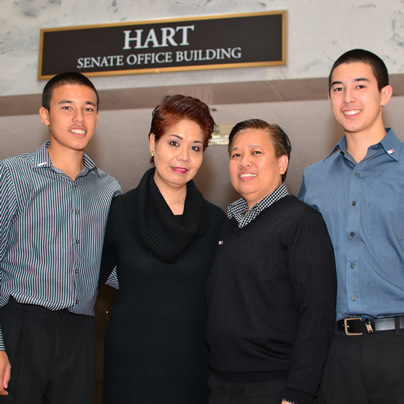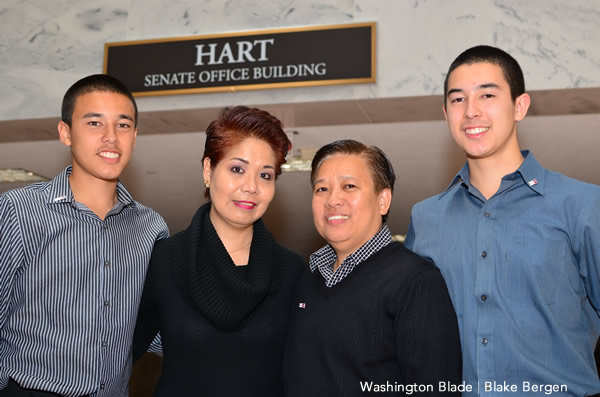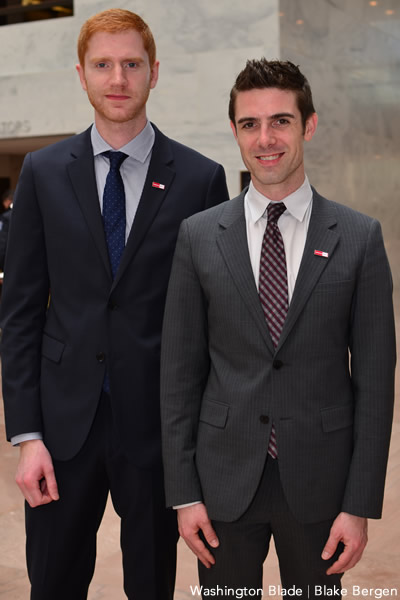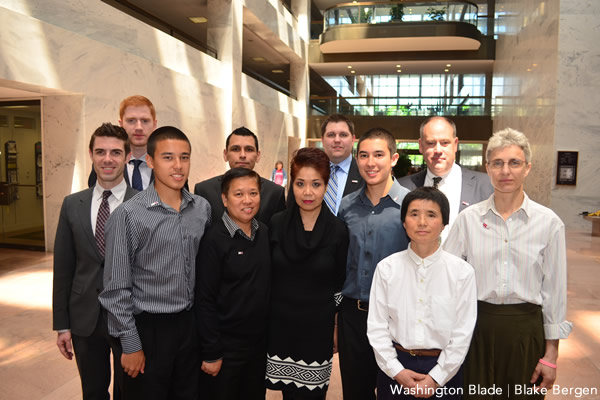National
Gay couples lobby Congress on immigration reform
‘We live in a very uncertain and scary place’


Shirley Tan, Jay Mercado and children Jorienne and Jashley Mercado. (Washington Blade photo by Blake Bergen)
For Shirley Tan and Jay Mercado, the debate on comprehensive immigration reform in Congress is a make-or-break moment that will determine whether their family can remain together in the United States.
The California couple, among the estimated 36,000 bi-national same-sex couples living in the United States, paid a visit to Capitol Hill on Wednesday along with other couples for a lobby day bearing a singular message: include the Uniting American Families Act as part of larger immigration reform.
Tan, a 47-year-old Philippines native who was denied asylum in 2009 and has since been threatened with deportation, said the inclusion of UAFA would be incredibly meaningful for her San Francisco-based family — as well as for other bi-national couples.
“My partner Jay, for 27 years, is faced with the problem of whether she has to quit her job and take everybody back to the Philippines,” Tan said. “She has an ailing mother who is on dialysis treatment right now, and I’m the one taking care of her, so don’t know if we have to put her in the home, and what about the kids? The Philippines is a foreign country to them.”
About 50 gay, bi-national couples from 26 states came to Capitol Hill on Wednesday as part of a lobby day effort organized by the LGBT group Immigration Equality.
Rachel Tiven, executive director of Immigration Equality, called the lobbying by the couples “really a huge asset” in ensuring protections for same-sex couples are included as part of immigration reform.
“These families today are here to look their members of Congress [in the eye], especially look their senators in the eye, one more time and tell them how much this matters to LGBT families,” Tiven said. “Everyone here knows that they’re representing not only themselves, not only their state, but they’re representing all the LGBT immigrants around the country, and around the world, that are waiting for change.”
Bi-national same-sex couples, where one individual is a foreign national and another is a U.S. citizen, are threatened with separation under current immigration code once the foreign national in the relationship falls out of legal status.
Straight Americans can sponsor their partners for residency in the United States, but that option isn’t available to gay Americans because of the Defense of Marriage Act and because they can’t marry in many places within the country. UAFA would enable gay Americans to sponsor their foreign partners for residency.
The moment for these bi-national same-sex couples will come soon. LGBT advocates are expecting an amendment along the lines of UAFA, which would enable gay Americans to sponsor their partners for residency in the United States, to come up when the Senate Judiciary Committee votes on the comprehensive immigration reform bill that was produced by the “Gang of Eight.”
On Wednesday, the couples met with a variety of lawmakers from across the country. On the agenda for Tan and Mercada was a meeting with staffers for Sen. Dianne Feinstein (D-Calif.). A member of the committee, Feinstein has yet to make a public statement on whether she’ll support UAFA as part of immigration reform.
Mercado, 52, said the meeting went well, but the staffer for the California senator wouldn’t make promises about how she’d vote if a UAFA amendment came before the committee.
“She doesn’t know the exact answer from the senator, but she’s positive that she will be doing the right thing,” Tan said. “They saw a lot of the families that are affected, and most of the families that are affected by, the most bi-national couples, are in California. They say it’s about 10,000 couples in California alone.”
Feinstein’s office is staying quiet about whether she will support UAFA. Asked by the Washington Blade whether she’ll vote in favor of the legislation as an amendment to comprehensive immigration reform, Brian Weiss, a Feinstein spokesperson, said on Wednesday, “Sen. Feinstein is taking a look at the legislation. No announcement at this time.”
The California senator’s silence on UAFA is striking because the former San Francisco mayor is known for being a strong supporter for LGBT rights. She’s been the lead sponsor of legislation aimed at repealing the Defense of Marriage Act. Feinstein has also introduced a “private bill” limited to Tan and Mercado to keep them together in the United States.
The couple also met with Rep. Jackie Speier (D-Calif.), another UAFA co-sponsor, who gave her personal assurances that she’d vote in favor of a UAFA amendment as part of immigration reform once the legislation comes over to the House.
Tan and Mercado have made their case on Capitol Hill before. In 2009, Tan testified before the Senate on the importance of passing UAFA. Her testimony at the time, in which she recalled her arrest in 2009 when immigration officials took her from her home, was considered moving. It inspired tears from her children, to whom Senate Judiciary Committee Chair Patrick Leahy (D-Vt.) said their mother was a brave woman.
Jorienne and Jashley Mercado — now 16 — accompanied their parents for the lobby day on Capitol Hill to help make the case for UAFA and had an audience with Leahy himself, the sponsor of UAFA in the Senate, four years after that hearing.
“We thanked him for supporting our families and being a champion for our families, that he’s helping out all of us,” Jashley said. “He said, ‘I’m glad that I’m helping you guys because you guys are really an inspiration.'”
Jorienne said passage of UAFA as part of immigration reform would offer his family assurances that his mother would be able to stay in the country without fear of deportation.
“It would mean a tremendous amount to our family because our mom is such an integral part of our family,” Jorienne said. “If we don’t have her here with us, then we’re not a family.”
Despite words from supporters like Leahy, it’s not clear UAFA will ultimately be included in immigration reform. The Associated Press reported earlier this week that Democrats are “treading carefully” because they’re wary of adding another issue to immigration reform that has already been attacked by conservatives like Sens. Lindsey Graham (R-S.C.) and John McCain (R-Ariz.).
Still, Tiven maintained inclusion of same-sex couples in the larger vehicle would motivate the LGBT community to act.
“The LGBT community is a tremendous asset to pushing comprehensive immigration reform forward to the finish line,” Tiven said. “The LGBT community has proven over and over again — at the state level, at the federal level — we know how to get things done. We know how to pass legislation and we are bringing our power to LGBT-inclusive immigration reform.”
‘We still live in a very uncertain and scary place’
Also among the couples on Capitol Hill was Sam Conlon and Gary Wanderlingh, who reside in New Fairfield, Conn. Wanderlingh is seeking the opportunity to sponsor Conlon, a British national, for residency in the United States. Married in Connecticut in 2011, the couple has twice filed spousal petitions that were both denied on March 29.
While relocating to the United Kingdom is an option for the couple, Wanderlingh, 43, said he doesn’t want to leave New Fairfield because he’s taught in the same school district for 18 years. He’d lose his pension and would have to renew his teacher certification if he moved overseas.
“The most compelling thing is my elderly mother, where unfortunately my father passed away on what would have been our wedding day, our scheduled wedding day,” Wanderlingh said. “I made a promise to him that I would take care of mom, though now I’m being faced with the choice of breaking the promise that I made to Sam to be together for the rest of our lives.”
Upon their visit to Capitol Hill, the couple visited the office of Sen. Richard Blumenthal (D-Conn.), who’s already a UAFA co-sponsor. Conlon said they also spoke with staffers for Sen. Chris Murphy (D-Conn.) and Rep. John Larson (D-Conn.), and while they were supportive, received no commitments. Neither Murphy’s office nor Larson responded to the Blade’s request for comment on UAFA.
Conlon, 36, said he’s glad there’s an opportunity to have immigration reform passed that would help his family.
“We’re glad to see that there is a buzz around this,” Conlon said. “It’s very encouraging to see the winds changing in our direction in the last few months. But there’s never any guarantees, until it’s passed, until we know we have rights, we still live in a very uncertain and scary place.”
There could be another option for bi-national same-sex couples who are married. If the U.S. Supreme Court issues a ruling that strikes down Section 3 of DOMA, gay Americans could begin sponsoring their same-sex spouses for residency within the country. However, it’s not certain the court will strike down DOMA and other issues could arise in which UAFA would be needed.

Ben Story and Brandon Perlberg (Washington Blade photo by Blake Bergen)
Brandon Perlberg, 35, and Benn Storey, 31, who are living in exile in London after Perlberg, a U.S. citizen, had lived in New York City for 15 years and Storey, a British national, lived there for seven years. Although they aren’t married, they’re engaged and planning a London wedding.
Perlberg, an attorney, explained he chose to live in exile with Storey, who couldn’t remain in the United States after his work visa expired and he couldn’t get a green card through his employer.
“Because I can’t sponsor him for a green card, it became clear that Benn was going to have to move to the U.K., and that meant that I had to make a decision over whether I was to live my life in the country, or move to England with the person that I love,” Perlberg said. “I chose the latter. We moved to the U.K. in 2012. UAFA is the bridge; UAFA is the instrument that gives us the ability to return to the United States.”
The couple met with staffers for lawmakers from New York — Reps. Hakeen Jeffries (D) and Carolyn Maloney (D) — and had plans to meet with staffers for Sens. Chuck Schumer (D-N.Y.) and Kirsten Gillibrand (D-N.Y.), who co-sponsor UAFA.
“When you meet with a staffer, they can’t give you a firm position,” Perlberg said. “But I think that the meetings were generally positive. People seemed to understand our position, and as well, they seem to get that it’s not just about the couple, it’s about the couple’s family, it’s about the couple’s employers, it’s about the people that the couple relates to.”
Not every individual lobbied members of Congress with their significant other. Michael Upton, a gay 49-year-old South Hero, Vt., resident, came to Capitol Hill by himself because his partner of more than five years, a Brazilian national, is unable to come into the United States.
“It’s awful,” Upton said. “We’ve never been able to be together. He’s never met my family. My dad actually recently passed away. We petitioned for humanitarian parole so he could be there in Vermont, so we would have to choose. It was denied. I was in Brazil when my father died, so I couldn’t be with my family.”
Because the two live apart in different countries, Upton said he had to give up his job at the Veteran’s Administration caring for troops coming home from Iraq and Afghanistan to become a federal contractor so he could he have more flexibility to travel to see his partner.
Upton said he met on Capitol Hill with Leahy, and said the senator told him he’d do everything he could to ensure immigration reform is amended to include UAFA. Upton said he also met with staffers for gay Rep. Mark Pocan (D-Wis.) and Rep. Bill Owens (D-N.Y.), who also expressed support.
For Upton, passage of UAFA as part of immigration reform is the last hope for him and his partner to stay together in the United States. While he’s hopeful, he also realizes there’s no guarantee.
“This is the difference between whether or not we can continue,” said Upton as his eyes welled with tears. “I’m hopeful, but I’ve been hopeful about a number of opportunities for John to come and they’ve fallen flat. My state has the champion for this issue, and I think he’s completely committed, and he’s one of the most powerful men in the Senate, so if anybody can do it, he can.”

Bi-national same-sex couples lobby Congress to include UAFA as part of immigration reform. (Washington Blade photo by Blake Bergen)
CORRECTION: An earlier version of this article incorrectly attributed quotes to Sam Conlon and Gary Wanderlingh. Additionally, the article incorrectly suggested UAFA could be an alternative for gay Americans to sponsor their foreign partners for residency in the United States after DOMA is struck down if their relationship isn’t a legal marriage. However, UAFA won’t be operative for these couples after DOMA is gone because Section 2, Part D of UAFA states the law doesn’t apply to couples who are able to enter into “a marriage cognizable under the Act,” which would be all bi-national couples in a post-DOMA world. The Blade regrets the errors.
Lavi Soloway, a gay immigration attorney and co-founder of The DOMA Project, explained further the situation for bi-national couples in a post-DOMA world.
“After Section 3 of DOMA is struck down, many unmarried lesbian and gay binational couples will marry in the states or countries where marriage is legal for same-sex couples,” Soloway said. “Those couples already living in ‘marriage equality’ states will be able to marry where they live, while other couples will travel out of state to marry as gay and lesbian couples do every day in this country. Thousands of bi-national couples who are separated or exiled abroad and who are not married, may be eligible to petition for fiance visas so that the foreign partner can come to the United States to marry and to apply for a green card based on that marriage. Because immigration law is so complicated and so much is at stake in these cases, all binational couples are strongly advised not to take any action after the Supreme Court rules on DOMA without first seeking legal counsel. “
U.S. Supreme Court
Supreme Court to consider bans on trans athletes in school sports
27 states have passed laws limiting participation in athletics programs

The U.S. Supreme Court on Thursday agreed to hear two cases involving transgender youth challenging bans prohibiting them from participating in school sports.
In Little v. Hecox, plaintiffs represented by the ACLU, Legal Voice, and the law firm Cooley are challenging Idaho’s 2020 ban, which requires sex testing to adjudicate questions of an athlete’s eligibility.
The 9th U.S. Circuit Court of Appeals described the process in a 2023 decision halting the policy’s enforcement pending an outcome in the litigation. The “sex dispute verification process, whereby any individual can ‘dispute’ the sex of any female student athlete in the state of Idaho,” the court wrote, would “require her to undergo intrusive medical procedures to verify her sex, including gynecological exams.”
In West Virginia v. B.P.J., Lambda Legal, the ACLU, the ACLU of West Virginia, and Cooley are representing a trans middle school student challenging the Mountain State’s 2021 ban on trans athletes.
The plaintiff was participating in cross country when the law was passed, taking puberty blockers that would have significantly reduced the chances that she could have a physiological advantage over cisgender peers.
“Like any other educational program, school athletic programs should be accessible for everyone regardless of their sex or transgender status,” said Joshua Block, senior counsel for the ACLU’s LGBTQ and HIV Project. “Trans kids play sports for the same reasons their peers do — to learn perseverance, dedication, teamwork, and to simply have fun with their friends,” Block said.
He added, “Categorically excluding kids from school sports just because they are transgender will only make our schools less safe and more hurtful places for all youth. We believe the lower courts were right to block these discriminatory laws, and we will continue to defend the freedom of all kids to play.”
“Our client just wants to play sports with her friends and peers,” said Lambda Legal Senior Counsel Tara Borelli. “Everyone understands the value of participating in team athletics, for fitness, leadership, socialization, and myriad other benefits.”
Borelli continued, “The U.S. Court of Appeals for the Fourth Circuit last April issued a thoughtful and thorough ruling allowing B.P.J. to continue participating in track events. That well-reasoned decision should stand the test of time, and we stand ready to defend it.”
Shortly after taking control of both legislative chambers, Republican members of Congress tried — unsuccessfully — to pass a national ban like those now enforced in 27 states since 2020.
Federal Government
UPenn erases Lia Thomas’s records as part of settlement with White House
University agreed to ban trans women from women’s sports teams

In a settlement with the Trump-Vance administration announced on Tuesday, the University of Pennsylvania will ban transgender athletes from competing and erase swimming records set by transgender former student Lia Thomas.
The U.S. Department of Education’s Office for Civil Rights found the university in violation of Title IX, the federal rights law barring sex based discrimination in educational institutions, by “permitting males to compete in women’s intercollegiate athletics and to occupy women-only intimate facilities.”
The statement issued by University of Pennsylvania President J. Larry Jameson highlighted how the law’s interpretation was changed substantially under President Donald Trump’s second term.
“The Department of Education OCR investigated the participation of one transgender athlete on the women’s swimming team three years ago, during the 2021-2022 swim season,” he wrote. “At that time, Penn was in compliance with NCAA eligibility rules and Title IX as then interpreted.”
Jameson continued, “Penn has always followed — and continues to follow — Title IX and the applicable policy of the NCAA regarding transgender athletes. NCAA eligibility rules changed in February 2025 with Executive Orders 14168 and 14201 and Penn will continue to adhere to these new rules.”
Writing that “we acknowledge that some student-athletes were disadvantaged by these rules” in place while Thomas was allowed to compete, the university president added, “We recognize this and will apologize to those who experienced a competitive disadvantage or experienced anxiety because of the policies in effect at the time.”
“Today’s resolution agreement with UPenn is yet another example of the Trump effect in action,” Education Secretary Linda McMahon said in a statement. “Thanks to the leadership of President Trump, UPenn has agreed both to apologize for its past Title IX violations and to ensure that women’s sports are protected at the university for future generations of female athletes.”
Under former President Joe Biden, the department’s Office of Civil Rights sought to protect against anti-LGBTQ discrimination in education, bringing investigations and enforcement actions in cases where school officials might, for example, require trans students to use restrooms and facilities consistent with their birth sex or fail to respond to peer harassment over their gender identity.
Much of the legal reasoning behind the Biden-Harris administration’s positions extended from the 2020 U.S. Supreme Court case Bostock v. Clayton County, which found that sex-based discrimination includes that which is based on sexual orientation or gender identity under Title VII rules covering employment practices.
The Trump-Vance administration last week put the state of California on notice that its trans athlete policies were, or once were, in violation of Title IX, which comes amid the ongoing battle with Maine over the same issue.
New York
Two teens shot steps from Stonewall Inn after NYC Pride parade
One of the victims remains in critical condition

On Sunday night, following the annual NYC Pride March, two girls were shot in Sheridan Square, feet away from the historic Stonewall Inn.
According to an NYPD report, the two girls, aged 16 and 17, were shot around 10:15 p.m. as Pride festivities began to wind down. The 16-year-old was struck in the head and, according to police sources, is said to be in critical condition, while the 17-year-old was said to be in stable condition.
The Washington Blade confirmed with the NYPD the details from the police reports and learned no arrests had been made as of noon Monday.
The shooting took place in the Greenwich Village neighborhood of Manhattan, mere feet away from the most famous gay bar in the city — if not the world — the Stonewall Inn. Earlier that day, hundreds of thousands of people marched down Christopher Street to celebrate 55 years of LGBTQ people standing up for their rights.
In June 1969, after police raided the Stonewall Inn, members of the LGBTQ community pushed back, sparking what became known as the Stonewall riots. Over the course of two days, LGBTQ New Yorkers protested the discriminatory policing of queer spaces across the city and mobilized to speak out — and throw bottles if need be — at officers attempting to suppress their existence.
The following year, LGBTQ people returned to the Stonewall Inn and marched through the same streets where queer New Yorkers had been arrested, marking the first “Gay Pride March” in history and declaring that LGBTQ people were not going anywhere.
New York State Assemblywoman Deborah Glick, whose district includes Greenwich Village, took to social media to comment on the shooting.
“After decades of peaceful Pride celebrations — this year gun fire and two people shot near the Stonewall Inn is a reminder that gun violence is everywhere,” the lesbian lawmaker said on X. “Guns are a problem despite the NRA BS.”
-

 U.S. Supreme Court3 days ago
U.S. Supreme Court3 days agoSupreme Court to consider bans on trans athletes in school sports
-

 Out & About3 days ago
Out & About3 days agoCelebrate the Fourth of July the gay way!
-

 Virginia3 days ago
Virginia3 days agoVa. court allows conversion therapy despite law banning it
-

 Federal Government5 days ago
Federal Government5 days agoUPenn erases Lia Thomas’s records as part of settlement with White House












